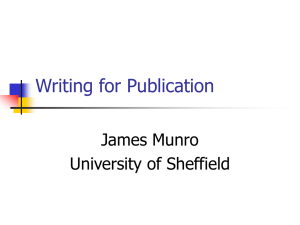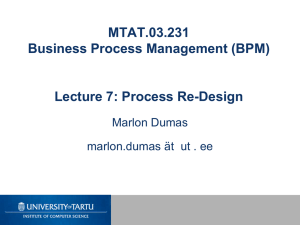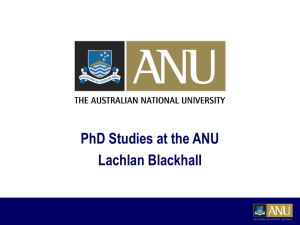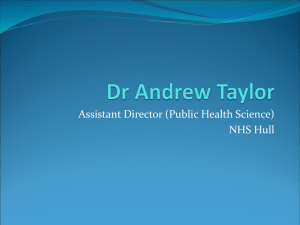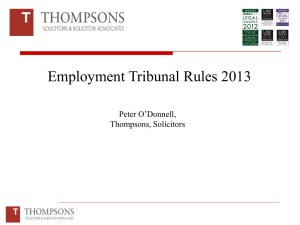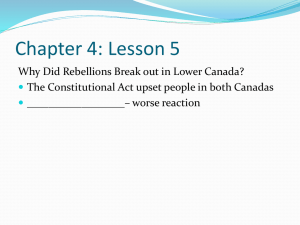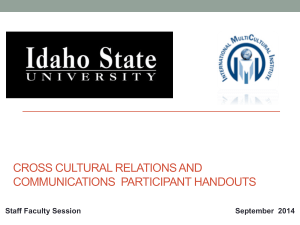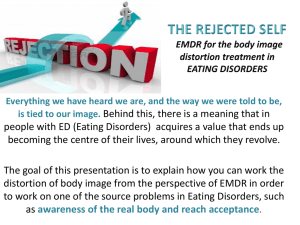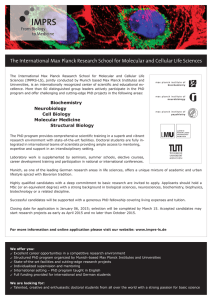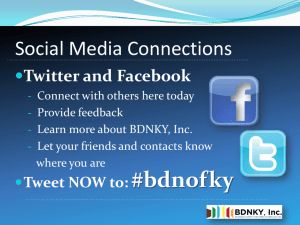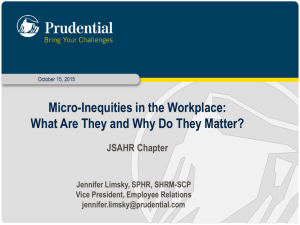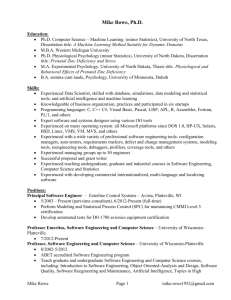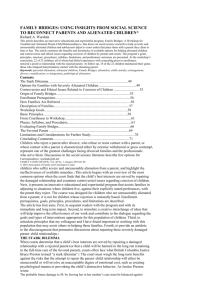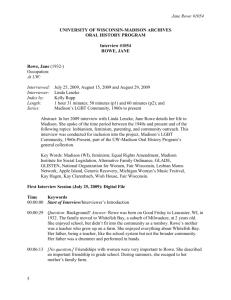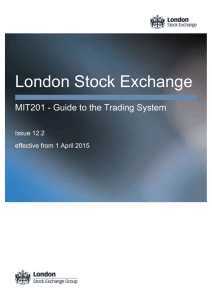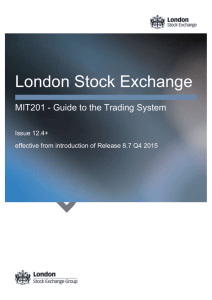Slides
advertisement
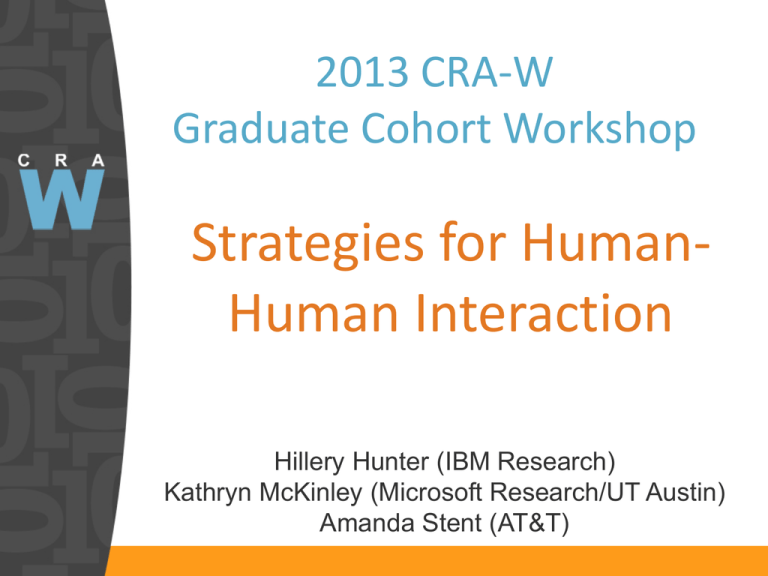
2013 CRA-W Graduate Cohort Workshop Strategies for HumanHuman Interaction Hillery Hunter (IBM Research) Kathryn McKinley (Microsoft Research/UT Austin) Amanda Stent (AT&T) About Hillery Research Staff Member and Manager, Systems Technology and Architecture, IBM TJ Watson Research Center, Yorktown Heights, NY PhD from University of Illinois at Urbana-Champaign, Electrical Engineering Research areas: Computer architecture, green computing, memory systems, new memory technologies Hobbies Travel, outdoor activities, theology, cooking & baking (recent success with a Buche de Noel!) Kathryn McKinley Principal Research, Microsoft Software for future hardware fast, portable, secure, energy efficient Programming Language Implementation DaCapo Benchmarking Cross system boundaries Software for Heterogeneous Hardware • Professor, UT Austin + • ACM Fellow, IEEE Fellow • 17 PhD students • Testified to Congress Energy Failures • • • • • • • • Rejected: jobs (all) Failed: my Rice PhD qualifying exam Rejected: jobs (8 of 11) Rejected: my first three grant applications Bad teaching evaluations Rejected 2 times: 10 years, my most cited Rejected: jobs (some) Rejected: papers, grants, papers, grants, papers, papers, papers … 4 About Amanda Current job and education: •Principal Member of Technical Staff, AT&T Labs – Research, Florham Park, NJ •PhD from University of Rochester, Computer Science Research areas: dialog, natural language generation, computational linguistics, assistive technology Hobbies: EMT, taekwondo, piano Also An introvert A recovering perfectionist About Amanda I love doing computer science Most of the time, I like the people I work with My experience as a woman in computer science is framed by micro-inequities and micro-affirmations (Rowe, 1990; Rowe, 2008) •Micro-inequities are “apparently small events which are often ephemeral and hard-to-prove, events which are covert, often unintentional, frequently unrecognized by the perpetrator, which occur wherever people are perceived to be ‘different.’” (Rowe, 2008) •Micro-affirmations are “apparently small acts, which are often ephemeral and hard-to-see, events that are public and private, often unconscious but very effective, which occur wherever people wish to help others to succeed.” (Rowe, 2008) Teleconferences The world’s not flat! In the US, the team I work with on a daily basis is spread across: New York (3 sites), Texas (3 sites), California (2 sites), Vermont, Minnesota, North Carolina International teams I have worked with: Haifa, Israel; Boeblingen, Germany; Delhi, India International teams I work with now: Zurich, Switzerland (+6 hours); Tokyo, Japan (+13 hours); Bangalore, India (+9.5 hours) These are just colleagues within my own company… across companies, I am on the phone regularly with people from Idaho to Seoul to Tokyo and beyond! IBM Research: Collaborative Innovation China Watson Almaden Austin Bra zil IBM Research Lab Global, Smarter Planet Collaborations Zurich Pangoo Tokyo Haifa India Human-Human Interaction: Telecons Teleconferences are a “necessary evil” of our global economy Some people learn to use them incredibly effectively Some people are terrified of them • Better to “make peace” with them early! Telecons 101 Use a good connection •Don’t skype/VoIP/cell phone if you don’t have a great connection Call from a quiet place • Don’t unnecessarily distract others Mute is your friend! Introduce yourself at the start of a call On a large call, give your name before asking your first/second question • So people learn to identify your voice Telecons: Making presentations Remote presentation fundamentals • Always put numbers on your slides • Make sure your slides are neat when not in presentation mode (animations, etc.) • Call out slide numbers as you speak • A&P: ASK and PAUSE • Ask questions to make sure your audience is understanding you (you’ll have no visual cues they’re confused… create your own cues) • Pause so others can get a word in edgewise Telecons: Leading a discussion Unless the call is very large, take a roll-call at the beginning, so you know who’s present Make sure relevant materials are sent to everyone prior to the call Plan & communicate an agenda, to keep everyone engaged • Attention naturally wanders when participants are not facing one another Telecons: Leading a discussion If most people are in the same room and only a few are remote, be over-considerate of those who are remote • Don’t let those in the room exclude/forget them Don’t be afraid to cut off discussions Don’t be afraid to address questions to specific people Instant messaging can be your friend, but don’t let it distract you After the call, ask for feedback DEALING WITH REJECTED PAPERS and bad reviews Writing Process? Prewriting Publishing Proofreading Drafting Revising Writing Process Prewriting Submitting Drafting Reject/accept Ask a friend Proofreading Revising Academic Writing and Perfectionism “Academic writing has the greatest potential to inflame perfectionism for several reasons…the lack of built-in accountability for writing, the fact that academic writing is a long and difficult process, and that the nature of knowledge production guarantees criticism” – Kerry Ann Rockquemore Becoming Realistic “Even for highly successful academics, criticism and rejection never entirely goes away” •Female Science Professor “To survive the review process, you've got to look at reviews through a certain type of lens or filter that allows you to ignore the useless comments from cranky reviewers and extract the essence” • Female Science Professor Rejected Paper/Proposal Breathe Know that you are not alone Put the reviews aside for a day or two Read them again (with your coauthors or a friend), focusing on the facts – Comments on the research: are they reasonable? How long would it take you to do the extra work? – Make a plan! – Comments on related work: look it up – Comments on the writing: deal with them Resubmit! Special Cases Very short (negative) reviews The dreaded you should cite <yourself> Personal attacks Biased reviews by your competition Other Comments Practice Find writing partners Don’t put all your eggs in one basket Be a good reviewer CULTURAL ISSUES Cultural Issues Cultural Issues Taulbee survey, 2010-2011 results Cultural Issues Be observant •What is happening? Why does it make you uncomfortable? •Is this person clueless or malicious? Be direct •Don’t do that •When you <X>, it makes me uncomfortable because <Y> Give a chance to the uninformed •But no one is “owed” your forbearance Find your champions •Can you come with me to talk to <X>? Climb the chain if necessary •I need your help. •I need to report an incident. IGNORING/INTERRUPTING Ignoring/Interrupting Establish your presence •Be the first in the room and greet others as they come in •Introduce yourself to anyone you don’t know Establish your voice early and late •Agree with someone, ask a question, or be the first to state an opinion •Take notes and circulate them, or follow up via email Be confident and strong •Avoid hedges like “I feel” or “maybe” •If someone “steals” your point, you can say “I’m so glad you agree with me that <X>” or “that was my point 5 minutes ago, thanks for expanding on it” Ignoring/Interrupting Find your champions •Someone who will ask your opinion, or confirm that you made a point Be a champion •Solicit input from everyone, note contributions of others Be direct if you have to •I have something to say •Please let me speak Prepare and practice Summary Participate Be prepared Be direct Be inclusive Don’t quit Recommended Resources • Writing – How to Write a Lot, Paul Silvia – Writing Science, Joshua Schimel – Writing for Computer Science, Joshua Zobel – Frédo Durand: http://people.csail.mit.edu/fredo/student.html – Purdue OWL: http://owl.english.purdue.edu/owl/ • Speaking – Crucial Conversations, Kerry Patterson – How to Control Any Conversation, Peter Murphy – Getting to Yes, Roger Fisher, William Ury & Bruce Patton – Toastmasters Recommended Resources • Confidence – Ms. Mentor's Impeccable Advice for Women in Academia, Emily Toth – Kidding Ourselves: Breadwinning, Babies, and Bargaining Power, Rhona Mahoney – Nice Girls Don't Get the Corner Office, Lois Frankel – Women Don't Ask: Negotiation and the Gender Divide, Linda Babcock and Sara Laschever – Kerry Ann Rockquemore: http://www.insidehighered.com/users/k erry-ann-rockquemore Additional Scenarios • • • • • • • • • • • • • In your group meeting, your colleague never looks at you and keeps interrupting you. Your collaborator student S wants to and is working on all your projects. You want to have some without S. You have been working on an idea and have some results, but your advisor has not suggested a venue or a publication plan. You are great at coming up with ideas and implementing solutions, but get stuck when writing them up. Your junior collaborator lacks confidence in public speaking. You are going to a conference and want to meet person X to talk about a research topic (or a job at their organization). How do you (an introvert) successfully navigate a three-day symposium with 400 attendees and 30 speakers, without exhausting yourself? You have been invited to interview for a job at X. The two-day interview will involve meetings with managers and engineers, as well as a coding test/talk/sample lesson. How do you prepare for the events on this interview? How do you safely and professionally handle human-human interaction in the digital area (emails, blogs, social networking)? How do you deal with the personal-professional boundary (going back to social networking, but also generally where lines are in the academic or professional workplace)? In general, how do you interact with someone who is your boss (either your advisor or a summer internship boss)? How do you consider the role of attire in human-human interaction (I recently read 60% of perceived "presence" is related to attire)? How do you have the “I’m expecting” conversation with your boss? Finding and Managing an Advisor What to look for •Research compatibility •Mentoring ability •Collaboration network •Assistant/Associate/Full First steps •Take their class •Read their papers •Talk to the other students Next Steps • Email for an appointment with specifics – I want to discuss becoming your PhD student. I am currently funded <how>. Please find below my relevant classes and experiences <resume, papers, classes, transcript>. I am interested in <project>. • Persist if Professor puts up an obstacle – He doesn’t have funding; She has too many students,etc. – I have my own funding. I have a TA. – Let’s do a one semester project. Next Steps • Prepare for appointment – Suggest specific projects on which you would like to work. (You know the current projects because you read papers & talked to students. – I read paper on X and I think Y would be a good next step. – It is your choice too! After a semester, assess, is this the person/topic I want to pursue? • Attend group meetings & related lectures Advisor Management • Ask for a weekly meeting • Stuck after a day, ask for an impromptu meeting or just show up in office hours • Weekly meeting management – – – – Email agenda 24 hours in advance Repeat high level project goal first (1 to 2 sentences) What you did this week What you want to talk about • Problems: ideas, implementation, bugs • Strategies, publication plans – Plan for next week – Every one or two months, program progress (exams, proposals, thesis, etc.) and goals
